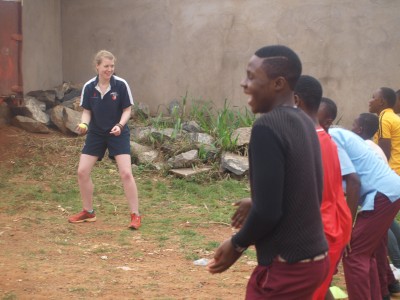If you speak to people in this country about their experiences of playing sport when they were younger, you come across a division. There are those who recall horror stories of being made to do cross country running on cold, wet Wednesday afternoons by sadistic coaches, bellowing at them to ‘keep moving’ as they hunker down under a large umbrella and lots of thermal clothing. Then you encounter the enthusiastic sporty types who played lots of different sports for their county and were wonderfully supported by their coaches. What about those who do not fit into either of those categories?
When I recall ‘undertaking’ sport at school, I remember laying out a multitude of coloured Asthma inhalers on a table, which twenty five years ago were little coaster size boxes, which when lined up on a white table looked like an artistic impression of a Dulux colour chart. Coaches saw a child running around who would stop, gasp for air, and amble slowly over to the table to get an inhaler, miss the rest of the session recovering and then ask what was the matter? Few coaches understood that it was not mind preventing you from taking part in sport, it was the lungs. Eventually being made, by the coach, to take the positions in team sports that involved the least running around to make up the numbers, just made playing sport boring and uninspiring.

Thing is I grew up in a sports loving household. It tests not only your physicality but also your mind. It drives and encourages the extremes of human emotion. Most of all it looks like great fun to be actively involved in. In reality, it appeared to be an exclusive fun for those who were good at it. It was not until my mid twenties, that going to the gym appeared to be a good idea and there were no boundaries set for what I could do. It made me fitter and improved my asthma.
It was by chance that I had the opportunity to experience what it was like to be properly involved in a team sport, following an impromptu call to take part in a game of cricket with a group of young lads in Jaffna, Sri Lanka. They did not care about health or ability of their team. All they wanted to do was to play and have people to play with. We celebrated wickets together, counted runs loudly when batting and gave each-other encouragement in the field. It was nice to be finally included in a team sport. These lads, I found out afterwards, were the main breadwinners for their family after their father and older brothers had either disappeared or died during the civil war. None of them were older than twenty. They all played cricket together one afternoon a week to have fun and enjoy themselves. It was an honour to play alongside them.
Not long after this, I saw the advert for Cricket Without Boundaries, seeking volunteers to coach cricket in various African countries, where they would use sports coaching to help make children aware of how to protect themselves against HIV. Now I was a.) Not a coach, b.) Couldn’t play cricket c.) Had limited knowledge of HIV. However, that experience in Jaffna, led me to apply and I was offered a place to be part of a volunteer coaching team out to Rwanda.

Seeing the slight flaw in this plan, I joined a ladies cricket team who had two fantastic lead female coaches who were not in the least bit fazed by someone’s health, fitness or ability – they just wanted people to be involved. This spirit has been mirrored by fellow volunteers who I have coached cricket with, as part of various Cricket Without Boundaries projects to Rwanda, Kenya and Cameroon. I have since qualified as a cricket coach so that I can share with children, in this country and abroad, just how great it is to take part in physical activity and most importantly of all that sport is available for everybody – as long as they have the chance.
And we got a fab team member, without whom I would never have got involved with this wonderful charity and met the most amazing groups of people both here and abroad.